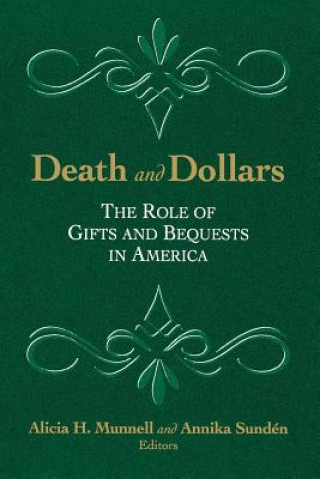
Kód: 04728118
Death and Dollars
Despite the recent downturn in the stock market, the 1990s boom and the shift to defined contribution plans mean that more individuals will have significant wealth upon retirement. How they use that wealth will determine not only ... celý popis
- Jazyk:
 Angličtina
Angličtina - Vazba: Brožovaná
- Počet stran: 432
Nakladatelství: Brookings Institution, 2003
- Více informací o knize

Mohlo by se vám také líbit
-

From Aristotle to Augustine
1575 Kč -

Danger-to-Self-or-Others Exception to Confidentiality
1098 Kč -

Horse in the City
1990 Kč -

Advanced Vocal Technique
611 Kč -

Audacious Ascetic
778 Kč -
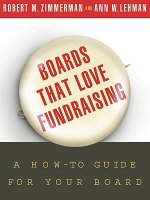
Boards That Love Fundraising - A How-to-Guide for Your Board
1125 Kč -

Hitler Laughing
1798 Kč -

Branded
494 Kč -

Dancing Cultures
1117 Kč -

Modern Livestock & Poultry Production
4043 Kč -

Henry I
1571 Kč -

Kamisama Kiss, Vol. 10
249 Kč -

Soviet Space Dogs
675 Kč -

Lazarus Book 1
805 Kč
Darujte tuto knihu ještě dnes
- Objednejte knihu a zvolte Zaslat jako dárek.
- Obratem obdržíte darovací poukaz na knihu, který můžete ihned předat obdarovanému.
- Knihu zašleme na adresu obdarovaného, o nic se nestaráte.
Více informací o knize Death and Dollars
Nákupem získáte 110 bodů
 Anotace knihy
Anotace knihy
Despite the recent downturn in the stock market, the 1990s boom and the shift to defined contribution plans mean that more individuals will have significant wealth upon retirement. How they use that wealth will determine not only their own well-being, but also the living standards of their children, the resources available to philanthropies, and the level of investment capital in the economy. This volume explores the reasons why people save, how they decide to allocate their wealth once they retire, and how givers select their beneficiaries. It also assesses the extent to which the estate tax and annuitization of retirement wealth affects the amount and nature of wealth transfers. Finally, it looks at the impact of wealth transfers--first on the amount of aggregate saving and capital accumulation, and then on the distribution of wealth among households. Several conclusions emerge. First, gifts and bequests are important; they may account for about half of total wealth in America. Second, rich people make most of the wealth transfers. They are thoughtful about how much they pay in taxes and how they dispose of their wealth. They care about philanthropic causes and view their charitable contributions as more than a way to avoid paying estate taxes. Third, most nonrich people probably have some lexicographic preferences about the disposition of their wealth; they want to ensure they have adequate resources to take care of their own needs, and if money is left over, they would like it to go to their children. Fourth, little support has emerged for the pure altruistic model of bequests. Fifth, institutions matter. In the case of the rich, the estate tax probably reduces saving and increases bequests to charity. In the case of the nonrich, the shift to defined contribution plans will at a minimum mean that they have more wealth in their hands when they die, and therefore they will leave larger accidental bequests. It might also increase their interest in leaving an estate for their heirs. Saving and bequest behavior remains a fertile ground for future research. Major differences of opinion remain on such important issues as the effect of bequests on the distribution of wealth. The contributors to this volume provide a summary of existing knowledge, push the debate forward, and link topics in a unique and comprehensive way. At the same time, they make clear that many questions remain unresolved about the motives for and effects of wealth transfers.
 Parametry knihy
Parametry knihy
Zařazení knihy Knihy v angličtině Health & personal development Self-help & personal development Retirement
1098 Kč
- Plný název: Death and Dollars
- Podnázev: The Role of Gifts and Bequests in America
- Jazyk:
 Angličtina
Angličtina - Vazba: Brožovaná
- Počet stran: 432
- EAN: 9780815758914
- ISBN: 081575891X
- ID: 04728118
- Nakladatelství: Brookings Institution
- Hmotnost: 594 g
- Rozměry: 158 × 305 × 29 mm
- Datum vydání: 24. March 2003
Oblíbené z jiného soudku
-

If You Can
199 Kč -

How to Retire Happy, Wild, and Free
544 Kč -

Retirement The Psychology of Reinvention
463 Kč -

Artist's Way for Retirement
674 Kč -

Reboot Reinvent Rewire: Managing Retirement in the Twenty-First Century
312 Kč -

Traveling Around the World with Mike and Barbara Bivona
592 Kč -

Baby Boomers and Retirement Planning- A Multifactor Approach
1769 Kč -

Peace of Mind Investing
816 Kč -

Peace of Mind Investing
500 Kč -

Talking About Retirement
491 Kč -

Spiritual Wisdom for Successful Retirement
932 Kč -

Spiritual Wisdom for Successful Retirement
1559 Kč -

Retirement Boom
473 Kč -

Choose Florida for Retirement
383 Kč -

Get Up and Go
408 Kč -
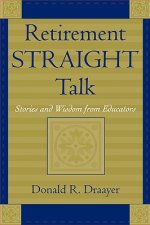
Retirement Straight Talk
1360 Kč -
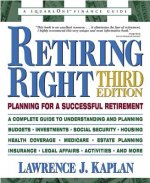
Retiring Right
585 Kč -
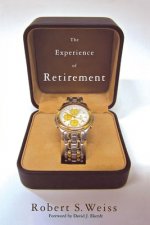
The Experience of Retirement
4190 Kč -

Retirement Reality Check
501 Kč -

Retirement
6031 Kč -
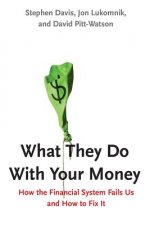
What They Do With Your Money
2309 Kč -

Mehr Rente und Rendite
929 Kč -

Aufblühen im Alter
553 Kč -

It's the Income, Stupid
650 Kč -

Purposeful Retirement Workbook & Planner
519 Kč -
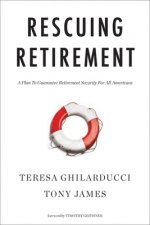
Rescuing Retirement
656 Kč -

Poised for Retirement
496 Kč -

TIPS
638 Kč -

Create Your Retirement
720 Kč -

Objective Guide to Fixed and Indexed Annuities
581 Kč -
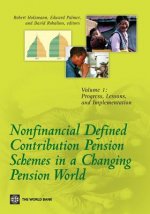
Nonfinancial Defined Contribution Pension Schemes in a Changing Pension World: Volume 1
1320 Kč -
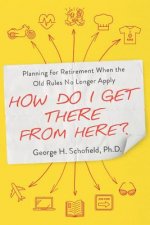
How Do I Get There from Here?: Planning for Retirement When the Old Rules No Longer Apply
472 Kč -
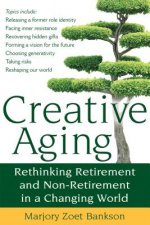
Creative Aging
413 Kč -

International Living Guide to Retiring Overseas on a Budget - How to Live Well on GBP25,000 a Year
616 Kč -

Retire Rich with Your Self-Directed IRA
553 Kč -

Retirement Manual
522 Kč -

Engineering Your Retirement - Retirement Planning for Technology Professionals
1496 Kč -
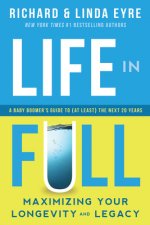
Life in Full
496 Kč -

Redefining Retirement
716 Kč -

Retirement Decisions
1563 Kč -

Role of Savings & Other Issues in Retirement Readiness
4394 Kč -

Retirement Association at the University of Washington
1886 Kč -

Social Security Disability
6031 Kč -

When We're 64
403 Kč -

Essential Retirement Planning for Solo Agers
499 Kč -

Lebensratschläge eines 110-Jährigen
648 Kč -

Fire Up Your Life in Retirement
427 Kč -

Rockstar Retirement Programme
403 Kč -

Joy of Retirement
501 Kč
Osobní odběr Praha, Brno a 12903 dalších
Copyright ©2008-24 nejlevnejsi-knihy.cz Všechna práva vyhrazenaSoukromíCookies



 Vrácení do měsíce
Vrácení do měsíce 571 999 099 (8-15.30h)
571 999 099 (8-15.30h)